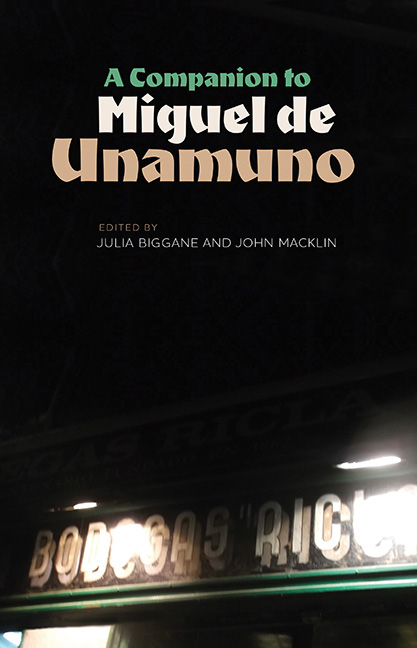6 - Wordgames: Unamuno and the Primacy of Language
Published online by Cambridge University Press: 21 May 2021
Summary
Unamuno's interest in linguistic matters can be traced back to at least age sixteen, when he was already making notes on the Basque language, a topic which was to figure prominently in his 1884 doctoral memoir on ‘El origen y prehistoria de la raza vasca’ [The origin and prehistory of the Basque people] and was to be the subject of many later articles. During his undergraduate studies at Madrid University he chose to attend the Spanish philology class even though this was not officially part of his degree. Early in his Salamanca career he put a great deal of effort into preparing a detailed philological study of the Cantar de mío Cid, and in 1900 he added the new Chair of Comparative Philology to his teaching responsibilities as Professor of Greek. He also became interested in the provincial lexicon of the charros, inhabitants of the Salamanca countryside and villages, and even of that of neighbouring provinces, collecting thousands of popular words and expressions. He was a prodigious learner of foreign languages, able to read easily in fourteen different ones, and for several years he supplemented his professorial salary by translating into Spanish, mainly from English and German (Spencer, Carlyle, Schopenhauer, Humboldt).
After the Real Academia Española rejected his Mío Cid study in favour of Menéndez Pidal’s, Unamuno experienced a certain reaction against philological investigation, and in letters to his friend Pedro Múgica in 1894 and 1895 he several times expressed his loss of interest in philology. Yet by 1896 he had recovered his curiosity, if not his enthusiasm: ‘No crea usted que tengo abandonada en absoluto la lingüística’ [Do not think that I have completely abandoned philology]. Unamuno's relationship with philology, then, had its ups and downs, but in any case what appears to have happened is that his early scientific training, which had included historical grammar, morphology, etymology and semiotics, gave way to a much broader interest in the phenomenon of language which was rather more psychological and cultural and rather less philological, or, as Unamuno himself put it, linguistic inquiry became for him ‘campo fecundísimo de enseñanzas psicológicas’ [a very fertile field of psychological lessons] (Larraín: 100), something he was to confirm in later letters when he mentions his reconciliation with linguistics.
- Type
- Chapter
- Information
- A Companion to Miguel de Unamuno , pp. 117 - 136Publisher: Boydell & BrewerPrint publication year: 2016



